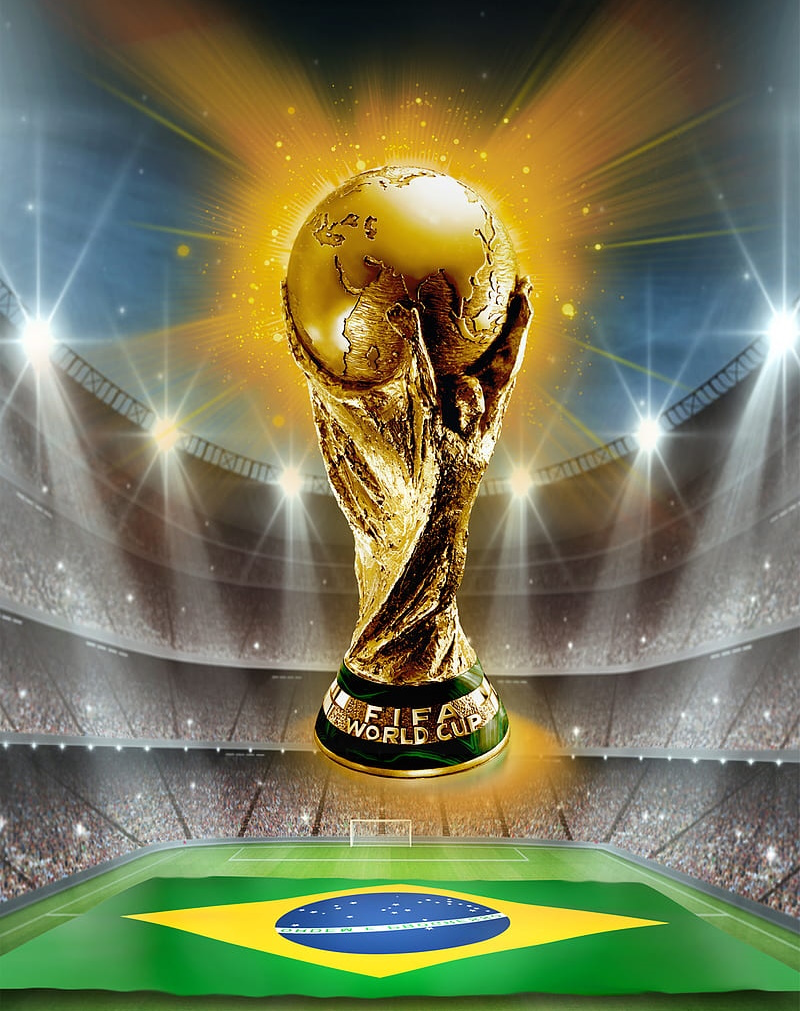Brazil is the only country that has participated in all the World Cup tournaments, taking third place on two occasions, becoming vice champions twice and getting the title five times in their history. It’s been over 20 years since the last time that Brazil won the World Cup. Let’s recollect the history of Brazil winning their five titles. Every victory has its own captivating story.
Maracanazo: The Shock of 1950
Before starting to talk about the history of the great success of the Brazilian side, we need to mention the greatest upset of 1950. That was a turning point for the team. Brazil didn’t get the title that year, but the result pushed the team to becoming one of the greatest sides in the football history with five titles won after 1950.
Brasil — Host and Debut of Maracanã
The 1950 World Cup was a symbol of getting back to a normal life after the devastation of World War II. After 12 years of absence, the tournament of the strongest national teams of the world substituted the clashes on the battlefields. Europe was still recovering from the damages of the war, Brazil, with developed and popular football, had one of the best infrastructures of the age. So they were chosen to host the tournament. The country was one of the main candidates, along with Germany, to host the 1942 World Cup, but that tournament was never to start.
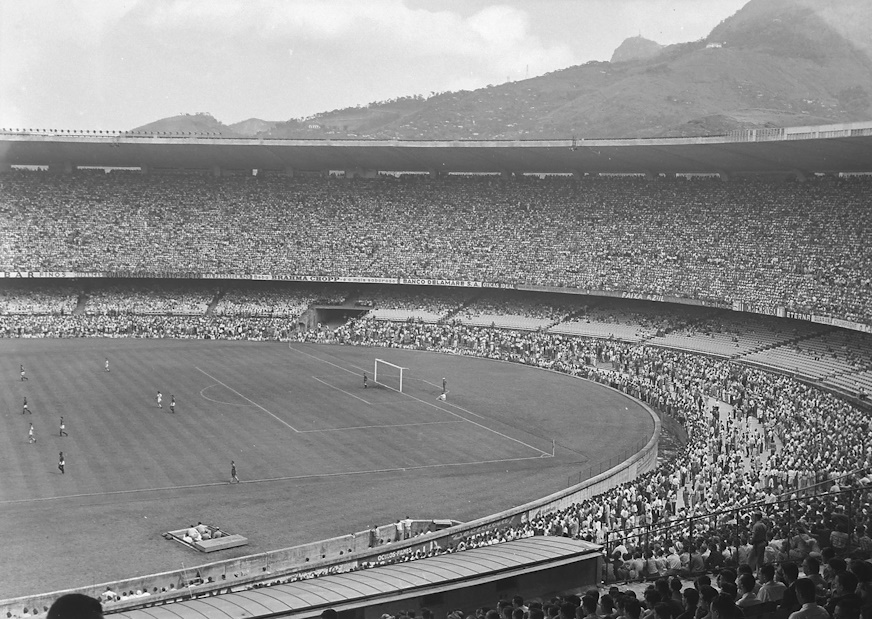
Six Brazilian cities, from Recife to Porto Alegre, were chosen to host the games of the World Cup. Among the stadiums that were built especially for the tournament, the legendary Maracanã stood out, it was the major stadium of the age, being opened two weeks prior to the start of the World Cup tournament.
Opponents of Brazil in 1950
The World Cup was held in 1950 only for the fourth time. Uruguay were the first to win the title, then Italy managed to get two consecutive tournaments. However, the post-war version of the Italian side wasn’t that strong anymore.
Besides these two teams, 14 more sides qualified for the tournament. However, Scotland, Turkey, and India decided not to participate. Turkey and India were discouraged by the high travel costs, while Scotland didn’t want to take part in the tournament, where England had already been presented. France and Portugal were invited instead, but they refused to participate. Germany wan’t allowed to take part in the tournament either.
Because of all the reasons mentions above, only 13 sides took part in the tournament instead of 16 that were supposed to be initially.
The Triumphant Journey of Brazil
The 1950 FIFA World Cup had different regulation compared to what we’re currently used to. Four teams that topped their groups formed a new group to play against each other.
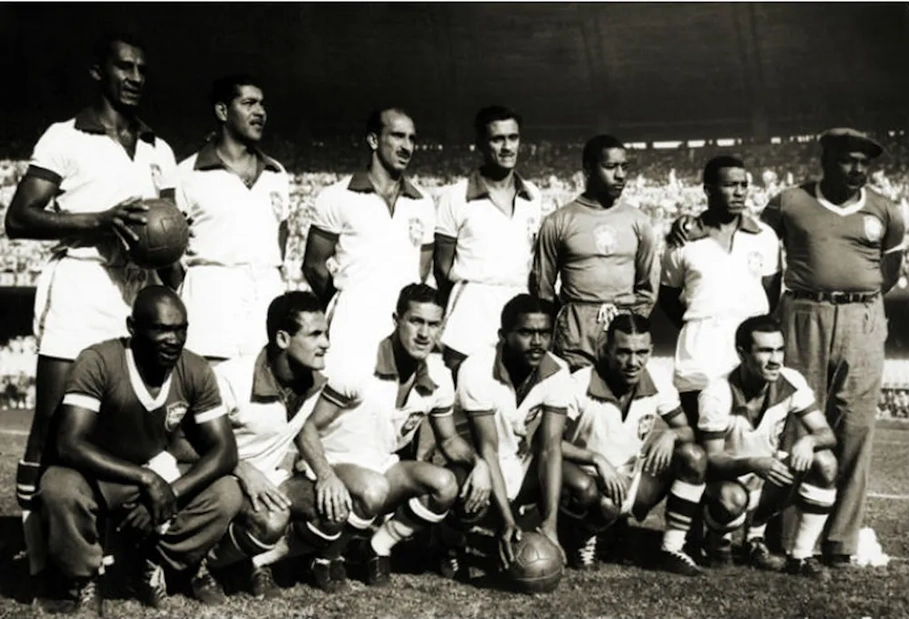
During the first stage, Brazil managed to beat without any problems Mexico and Yugoslavia, but ended a game versus Switzerland in a 2:2 draw. That match was played in São Paulo, at the Pacaembu stadium. The head coach Flávio Costa decided to give a chance to the local players to perform in front of their fans.
In the final stage, Brazil beat Sweden by 7:1 and Spain by 6:1, making all the fans to believe that victory was impending. Brazil needed just a draw in the final game versus Uruguay to get the title.
The Day that Shook the Brazilian Football
The 1950 FIFA World Cup didn’t have an official final match. Nevertheless, on July 16 Brazil and Uruguay entered the legendary Maracanã pitch to define the best team. It was one of the most memorable moments in the history of the World Cups.
The Brazilians were sure they would win. Many had no doubt that this would be exactly the end, they were ready to celebrate. Everyone was so sure about the triumph that the evening newspaper of Rio de Janeiro “A Noite” printed above the pictures of the Brazilian team: “These are the champions of the world”.
The inauguration of the first Brazilian TV station, Tupi of São Paulo, happened on September 18, 1950, about two months after the World Cup final. At that moment, the fans had two options, how to follow the games live. They could either be present at the stadium or listen the radio broadcasts. Impressing 199.854 spectators were present at the legendary stadium of Maracanã, almost 10% of the population of Rio de Janeiro. The rest of the country followed the game via radio broadcast.
Brazil opened the score at the 47th minute. Friaça scored the first goal and convinced everybody that the title was already in the hands of Brazilian players. However, 19 minutes later, Schiaffino leveled the score. Brazil only needed to keep the draw until the very end, but they failed to do so. At the 79th minute, Ghiggia scored the second goal for Uruguay, the one that brought the title to this national team and historical trauma to the Brazilian football.
The Hero of 1950 that Made the Maracanã Silent
While Ademir Marques de Menezes, also known as “Queixada”, which means “Jaw” became the best scorer of the 1950 World Cup, another player got in the real spotlight of the tournament.
The Uruguayan player Alcides Ghiggia became the most notable person of the competition. Years after that final, Ghiggia remarked that: “Only three people managed to silence the Maracanã, Frank Sinatra, the Pope, and me”.
1958: The Arrival of the King
Despite being the painful defeat, the 1950 World Cup final became the moment that had positive consequences for the Brazilian football. The essence of “Brazil, the country of the football” was born at that moment. That surprising defeat by Uruguay on their own field made Brazil to change their approach to football and their national team. They stopped using white shirts and started to wear the iconic yellow and green form with blue shorts and white socks.
After the failure of 1954, when Brazil was eliminated in the quarter-finals by Hungary, the 1958 World Cup, held in Sweden, marked the first achievement of the Brazilian side. A new star, called Pelé, was also born. That was the historical mark that pushed Brazil towards their legendary status in the world football.
Competitors and Favourites in 1958
Twelve European and four American national teams qualified for the World Cup. Germany, the current champion that took the title in 1954, arrived to the tournament after several defeats but still as a favourite, along with France, Argentina and Hungary, the vice-champions that surprised everyone four years before.
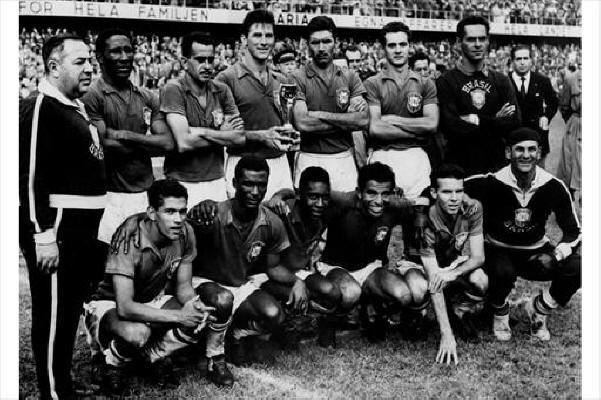
Another favourite before the start of the tournament was the USSR national team, the current Olympic champions, that took the title in 1956 in Melbourne.
The Brazilian team, despite being considered a strong team, wasn’t one of the real favourites.
Group Phase and the Star of Pelé
Brazil started the World Cup in Group 4, with Austria, England and the USSR. After beating Austria, Brazil faced some complications in the game versus England, which ended in a goalless draw. That was their first draw in the history of the World Cups. That made the task of advancing to the next stage a complicated thing for Brazil. Everything depended on the game versus the USSR.
After the match against England, the Brazilian head coach Vicente Feola decided to make three crucial changes. Zito, Garrincha and Pelé were in the starting XI in the game versus the Soviet side. From the very beginning, Brazil started to play offensively versus their opponents, after three minutes Vavá scored the first goal. Brazil kept on counter-attacking and after 77 minutes Vavá managed to score for the second time.
The First World Cup, Blue Kit
In the quarter-finals, young Pelé wrote his name in the history by scoring the only goal in the game versus Wales at the 66th minute. This was the first of the 12 goals that the King of the Fottball would score at the World Cups. After that match, Brazil showed the brilliant football in the semi-final game versus France, winning 5:2, with three goals scored by Pelé and two more made by Vavá and Didi.
A draw was held two days prior to the final to decide the colour of the kits for the teams. Hosts chose the yellow option, while Brazil now had some difficulties as they didn’t have another kit, besides the one they had been wearing. It was a bad omen for superstitious players who remembered the failure of 1950, when Brazil played in the white kit.
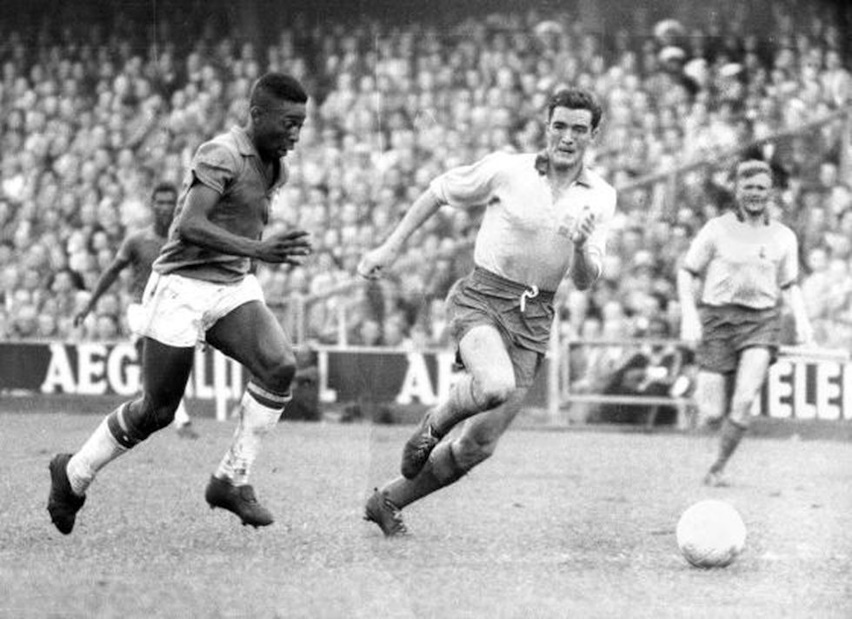
The head of delegation, Paulo Machado de Carvalho, offered choosing a blue shirt. They immediately ordered this kit in a local shop. The masseur Mário Américo and the wardrobe man Francisco Alves made numbers and badges during the train journey from Gothenburg, where Brazil played the semi-final game, to Stockholm.
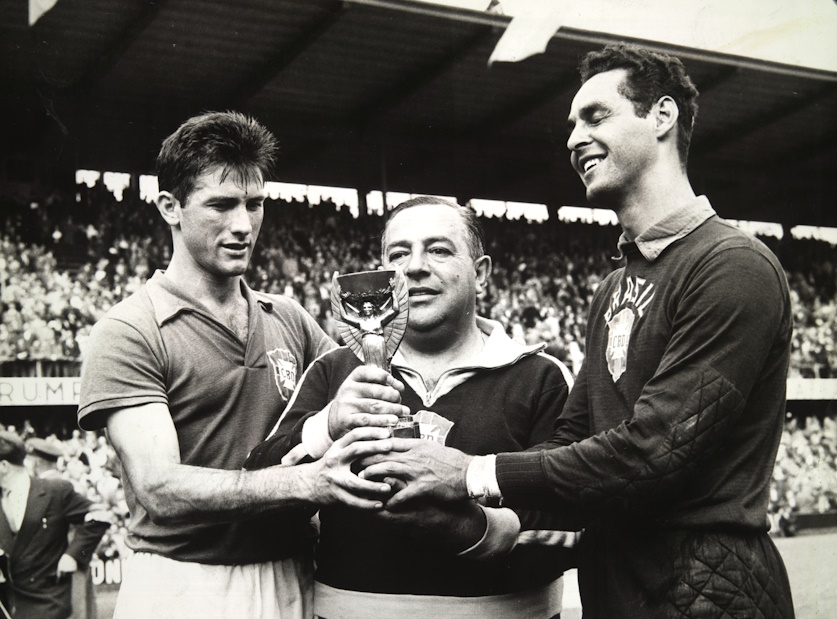
Sweden opened the score at the 4th minute. Liedholm scored. But their advantage didn’t last long. Vavá leveled the score within five minutes, and he scored the second goal at the end of the first half. Sweden didn’t manage to do anything in the second half. Pelé e Zagallo scored two more goals. Despite Simonsson scoring at the 80th, Pelé ended the game with another goal. The final score was 5:2, Brazil won the title.
Stars of the 1958 FIFA World Cup
The 1958 World Cup was full of famous names, but one player became the real hero of the tournament. Edson Arantes do Nascimento, better known as Pelé. Although it was his first participation in the World Cups, Pelé showed the extraordinary talent as one of the youngest players to get the World Cup title.
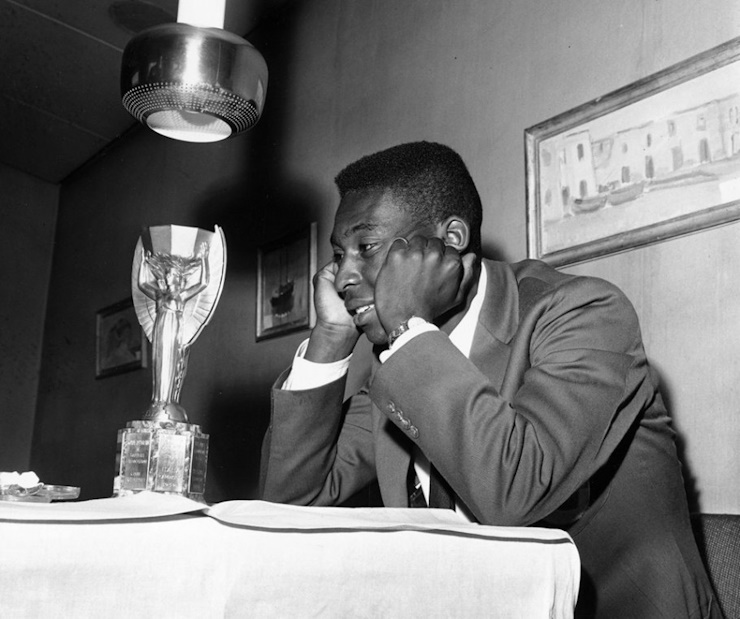
However, Pelé wasn’t the only star of that tournament. The competition was French player Just Fontaine becoming the best scorer in the history of the single World Cup with 13 goals scored, this record is still active today. Besides, players like Garrincha, Yashin, Didi, Vavá and the Brazilian captain Bellini were diamonds too, everybody contributed a lot into their teams’ success.
Bellini became the first captain to raise the World Cup trophy, a gesture that has become iconic and is still popular today across all tournaments.
Pelé, analysing the 1958 team, mentioned that it was the best national side in terms of quality of the players.
1962: Brazil Levelled with Uruguay and Italy
The seventh edition of the World Cup brought great expectations to the Brazilian national side. As current champions and favourites, especially because the tournament was held in South America again, Brazil had a series of impressing victories, including the games versus Argentina in the Roca Cup.
The Brazilian Sports Confederation chose to maintain the winning base that got the title in Sweden in 1958. The same effective planning remained.
Competitors and Favourites
Sixteen teams participated in the 1962 FIFA World Cup, with ten of them arriving from Europe and six coming from the Americas. The teams were really strong, and they could be dangerous for any side.
Among the rivals, the Soviet Union side was seemed to be one of the most dangerous as they won the first edition of the European Cup in 1960. Spain were one the favourites too, as their squad was full of the Real Madrid players, and this team had just become the five times title holder of the Champions League.
As for the American teams, Argentina and Uruguay were the strongest. Both sides followed the traditional South American football style and could be a real danger for Brazil.
The 1962 FIFA World Cup was supposed to be very competitive, with many national teams of the highest level trying to get the title. Brazil had to be better and beat these rivals to get the title they desired.
Brazil Becoming the Two-Time World Champion
Brazil faced challenges starting right from the 1962 FIFA World Cup group stage. They won the first game versus Mexico thanks to the goals scored by Zagallo e Pelé. Then, Brazil ended a game against Czechoslovakia in a draw. The last game was marked by an injury of Pelé. Nevertheless, Brazil had to beat Spain to advance to the play-offs, and they managed to did so. Amarildo scored twice against one goal of the Spanish side, and Brazil advanced to the next round.
The Brazilian side managed to beat England (3:1) in the quarter-finals and Chile (4:2) in a very emotional semi-final match.
In the final game Brazil faced Czechoslovakia, the team they didn’t manage to beat during the group stage. The beginning of the match wasn’t really promising for Brazil, as Czechoslovakia took the lead after Josef Masopust scored on the 14th minute. However, three minutes later Amarildo levelled the score with his great individual performance which surprised the opponent’s goalkeeper. Zito scored the second goal on the 69th minute and Vavá managed to score the third one ten minutes later, sealing the 3:1 victory for Brazil.
With this victory, Brazil levelled with Uruguay and Italy, becoming the two-time world champion. Now they were just one step away from definitive possession of the Jules Rimes Cup. Mauro raised the trophy in his hands, immortalising the gesture of Bellini everybody saw four years before. Brazil won five of the six game of the tournament, scoring 14 goals.
Stars and Best Scorers: e Artilheiros: Highlights of the 1962 World Cup
The 1962 World Cup didn’t have one particular best scorer. Six players scored four goals each, namely Garrinch and Vavá for Brazil, Leonel Sánchez for Chile, Flórián Albert for Hungary, Dražan Jerković for Yugoslavia, and Valentin Ivanov for the USSR.
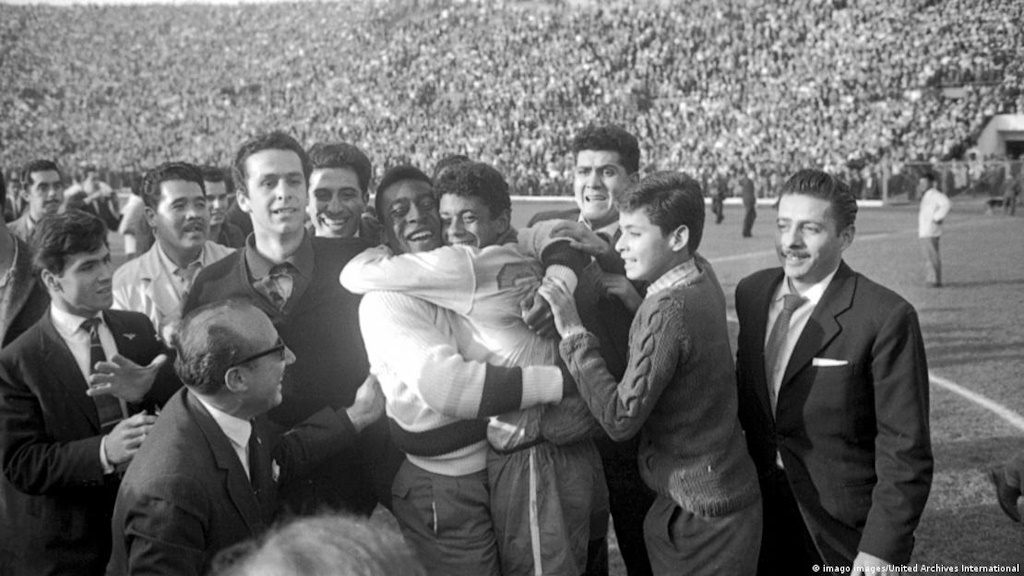
Before the start of the tournament, everybody expected for Pelé to be the main star, but it never happened. Without the King of Football being really present at the tournament, Garrincha took the role of the main protagonist for the Brazilian side thanks to his greatest performance. Amarildo also had a crucial role for Brazil becoming the champion, especially during the group stage game against Spain. Vavá didn’t manage to get such popularity as Pelé or Garrincha, but he kept scoring very important goals almost in every game, just like it was in 1958.
1970: The Triple Revenge
Brazil entered some kind of the relaxation period after the 1962 World Cup. They started a general renovation of the national team, which lead to Brazil being eliminated after the group stage of the 1966 tournament. However, they become even stronger after that sad experience and came back in 1970 to reign in Mexico.
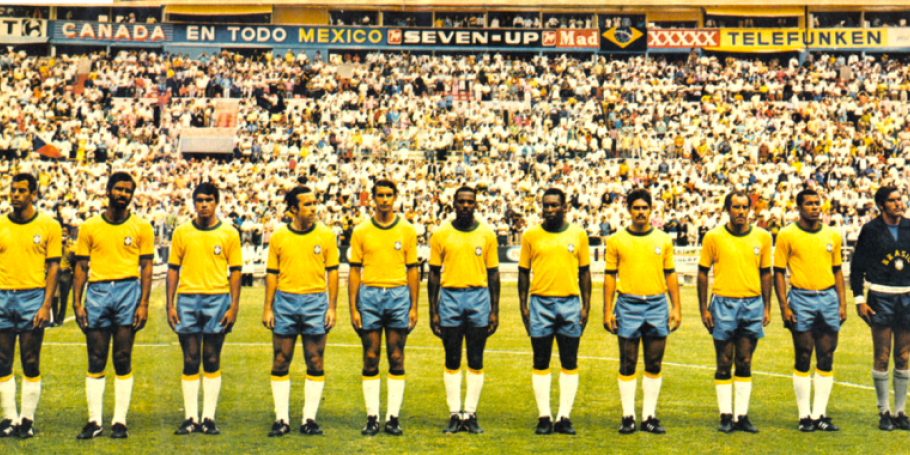
Brazil won all their six games, becoming the first three-times world champions. They also managed to get three important historical revenges: against England, 1966 champions, Uruguay that brought the 1950 trauma, and Italy that beat Brazil in the semi-finals of the 1938 World Cup.
Competitors, Favourites and Innovations
Mexico saw 16 teams participating in the tournament, which already was a common thing. Morocco, Israel and El Salvador were the debutants.
Favourites were pretty obvious. England had a team even stronger than the one that won the 1966 tournament. The Italian side was in the exceptional form, and they wanted to get back and get the title 32 years after they did it last time. Germany were looking for the vengeance for the defeat in the 1966 final. Of course, the Brazilian team lead by Pelé was among the leaders too.
The 1970 World Cup became an important part of the football history not only because of the exciting games, but also because some new rules were implemented. The most significant innovation was the ability to make two substitutions during a game. Before that, a team had to end the game with the same 11 players that were in their starting line-up.
Another innovation was an introduction of two cards. It didn’t change the rules but made it easier for players, other officials, and fans to realise what penalty was given to a player.
The Journey of Brazil: Beating England and Uruguay on the Way to the Final
The group stage saw one of the principal games of the tournament. The one between the 1966 and 1962 champions. England seemed to be a very strong team. The header of Pelé and the save of Banks became the historic moment, known as “Defence of the Century”. It was a very tense game, a decisive goal scored by Jairzinho determined the result.
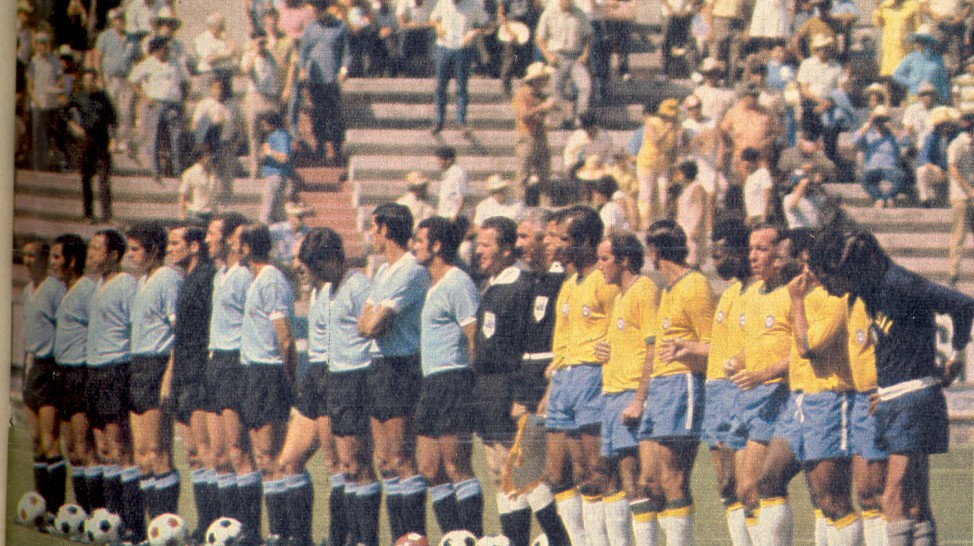
Brazil beat Peru without any problems in the quarter-finals. The next team was Uruguay, the side that kept on bringing some vivid memories. Uruguay opened the score, but Brazil levelled by the goal of Clodoaldo. Jairzinho scored the second goal and Rivellino set the final result. Twenty years after the defeat at the Maracanã, Brazil closed that painful page of their history.
The Permanent Possession of the Jules Rimet Cup by Brazil
On June 21, 1970, the day that became one of the main milestones of the Brazilian football, no one was sure what was going to happen.
Over 100 000 fans came to the Azteca stadium to see the final game. The first half ended in a 1:1 draw, with the goals scored by Pelé and Boninsegna. In the second half, the Italian team, that was tired after the semi-final match versus Germany, couldn’t resist anymore. After 20 minutes of the second half, Gérson took the rebound after the Jairzinho play. He made an incredible shot with his left leg that became the really great goal that astonished the stadium. It was the first goal of Gérson at this tournament. Just five minutes later Gérson sent the ball to the area where Pelé caught it and made a pass with his head to Jairzinho who scored another Brazilian goal. Carlos Alberto set the final result that confirmed the supremacy of the Brazilian side.
This victory meant that Brazil became the first team to win three titles in the history of the World Cups. Now they could permanently keep the trophy created by the Belgian artist. FIFA had to make a new trophy, that no other winner of the World Cup could ever keep permanently anymore.
Stars and Best Scorers: Highlights of the 1970 World Cup
Six Brazilian players were added to the best team of the 1970 World Cup: Carlos Alberto, Clodoaldo, Gerson, Jairzinho, Pelé and Rivellino.
It was the last World Cup for Pelé. He became the first player to win three world trophies. He had a plenty of brilliant moments at the tournament that showed that he was a genius with incomparable abilities. However, the greatest star of this Brazilian team was Jair Ventura Filho, better known as Jairzinho, the “World Cup Hurricane”. He scored at least a goal in every game, the thing that no one has ever repeated in the World Cup history.
1994: The Victory of Pragmatism
After the 1970 success, Brazil couldn’t win the title for 24 years. In 1994, before the start of the World Cup in the United States, Brazil still was considered favourite, but their fans didn’t believe that the team would win, especially after the national side has almost been eliminated in the qualifying games.
The 1994 World Cup was the last with 24 teams, starting from 1998 there would be 32 sides trying to get the title.
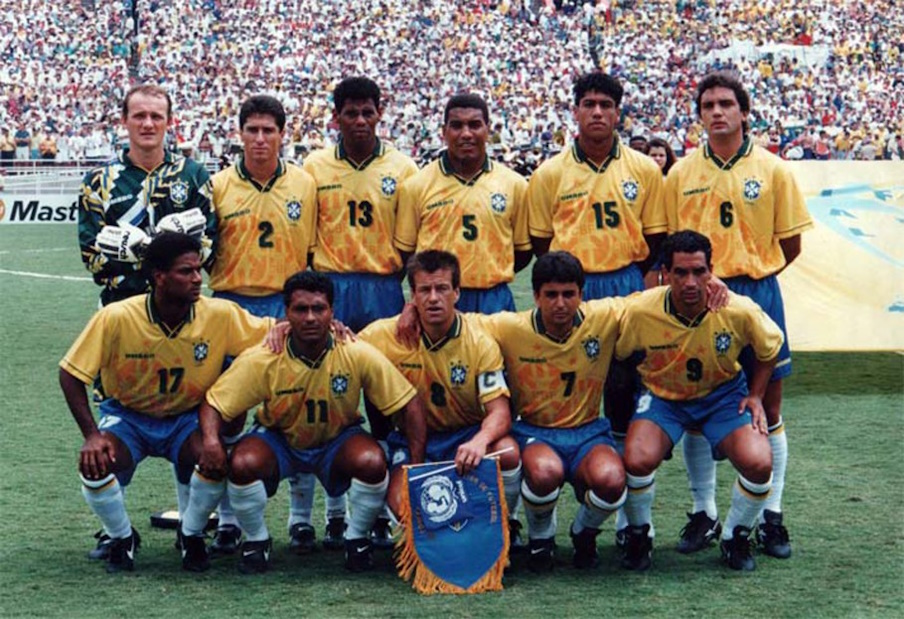
Many were discussing the possibility of a European win to get the title for the first time on another continent. Germany were considered favourites on this case, along with Italy and the Netherlands. Besides them, Argentina, the 1986 champions, were considered favourites.
However, the 1994 FIFA World Cup was a surprising tournament with many twists, which proved that football is an unpredictable game.
The Simple Path in the Group Stage and Difficulties in the Play-Offs
Brazil won the first two games of the group stage and ended the last match versus Sweden in a draw. But that match was only important for one purpose, which was to determine those who would take the first position.
In the play-offs, Brazil faced problems. In the Round of 16 Brazil, ending the game down to ten men, beat the host team of the United States 1:0, on the 4th of July, the Independence Day. In the quarter-finals, Brazil faced the Netherlands. This game was full of twists and ended with 3:2 to Brazil. The match was called “Battle of Dallas”.
The semi-final game between Brazil and Sweden was tense and defensive. Brazil won the match thanks to the goal scored by Romário on the 80th minute. Brazil advanced to the final of the tournament.
Brazil Win the Fourth Title in the Goalless Final
Brazil and Italy played in the final game on July 17, 1994. The squad of the Italian side was full of the great names, but the game was quite an upset. Brazil never managed to do anything with the solid Italian defence neither in regular time, nor in the extra time.
The result of the final was decided in the penalty shootout. The Brazilian goalkeeper Taffarel made a save after the shot of Massaro. After that, Dunga, the Brazilian captain, scored, giving his team an advantage. In the decisive shot Roberto Baggio sent the ball off the goal. Brazil became the four-time champions.
Romário: A Pinch of Art in the 1994 Pragmatism
Romário was selected the best player of the 1994 World Cup, although his 5 goals didn’t let him become the best scorer as Russian Salenko and Bulgarian Stoichkov shared this title with six goals scored by each.
For the Brazilians, however, this tournament was definitely the Cup of Romário. The talanted forward had been ignored by the national team even around a year before the tournament, but he showed his brilliant side during this unforgettable World Cup. He brought a pinch of talent in his very pragmatic team. He had speed, individualism, he made assists and scored five goals, including one header.
Another interesting character in the Brazilian side was Mário Jorge Lobo Zagallo, the only person to win the World Cup on four different occasions. He was a player in 1958 and 1962. He was the head coach in 1970. And in 1994, he managed to get the trophy as assistant manager.
2002: 100% of Wins
In 1998 Brazil were very close to winning the title again, but they lost the final to France. In 2002 the Brazilian side entered the tournament held in Japan and South Korea having a mix of players in the squad. Some of them were very experienced, they had already won the title. Some were young talents that only started their careers, like Kaká, who participated in his first World Cup.
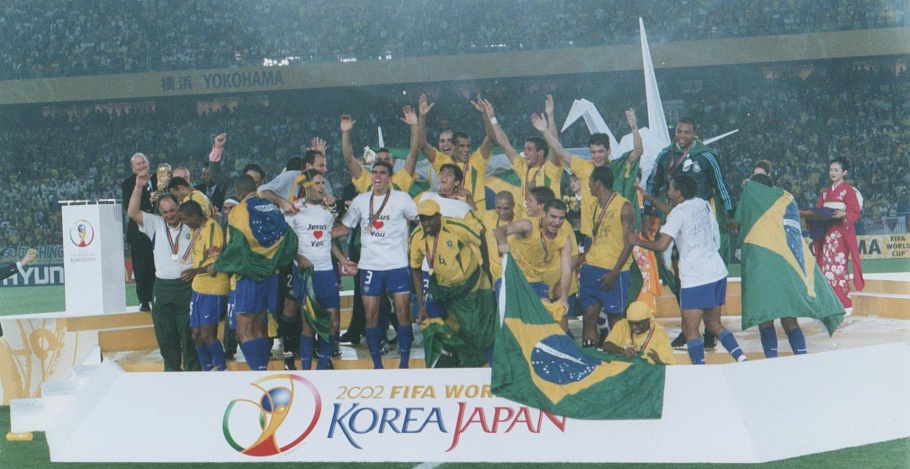
The call-up of Romário was one of the most important topics. The legendary player had the public support. Even the president of the country, Fernando Henrique Cardoso, supported him. However, the head coach, Luiz Felipe Scolari, decided not to take Romário to the World Cup. Scolari explained his decision later, citing the speed of Romário, who was 36 years old at the moment of World Cup, as the main reason: Romário is a fantastic player in the last 20 meters, but I had to maintain a dynamic team with very strong attacking line”.
Scolari chose the 3-5-2 scheme. It was the second time the Brazilian team used these tactics since the 1990 World Cup.
Participants and Expectations: Favourites, Uncertainties, and Brazilian Challenge
Germany, Italy and Argentina were considered favourites of this tournament. France, the 1998 champions, weren’t in a good form, it became obvious during the group phase.
Brazil faced challenges. The really struggled to advance to the play-offs, they didn’t show a convincing football. Two of their main players, Ronaldo and Rivaldo, were recovering from injuries, and they were far from their best form.
Two Games Versus Turkey and the “Most Difficult” One Against Belgium
In the group stage, Brazil only had some problems in the game versus Turkey that was strong in 2002. The matches against China and Costa Rica were an easy walk for the Brazilian team that scored nine goals in these two games.
In the Round of 16, Brazil beat Belgium (2:0). Ten years later, Ronaldo described that match as “the most difficult” one. Both goals were scored in the last half an hour. Brazil conceded the first goal in the game versus England. It was scored by Owen. Rivaldo got this team back to level terms and Ronaldinho scored the decisive goals that became historical. He shot from the long distance when everybody were waiting for a cross, especially the English goalkeep David Seaman, who could only watch the ball passing over his head.
In the semi-final game against Turkey, Ronaldo scored the only goal on the 49th minute. Later, he claimed that “it was the only chance he had in the second half”.
Brazil vs Germany: The First Clash between Them at the World Cups
The final match between Brazil and Germany was historical. That was the first time these two teams, that had a long story of the World Cup success, played against each other in the tournament. Both teams played in the final games 7 times, setting the record.
Brazil were that favourites of the games, according to the bookmakers. Although Germany was pressing time after time, the Brazilian goalkeeper Marcos didn’t have to intervene often, he only had some work to do in the second half. On the other hand, Kahn, the German goalkeeper made some important saves. However, he also made a crucial mistake. On the 67th minute, after a shot of Rivaldo, he dropped the ball from his hands, allowing Ronaldo to score. Ten minutes later, Ronaldo scored another goal with the assistance of Rivaldo, setting the final score.
At the 2002 FIFA World Cup, Brazil repeated the success they had in 1970 as they won all the seven games of the tournament.
Ronaldo: The Star of 2002
Ronaldo had serious physical problems at the 2002 FIFA World Cup. He could have missed the tournament due to knee injuries and muscular problems. Nevertheless, Luiz Felipe Scolari believed in the talent and determination of the player.
During the World Cup, Ronaldo was simply magnificent. He scored in six of the seven games, proving he deserved to be in the starting line-up and becoming the best scorer with 8 goals.
The Golden Ball of the 2002 World Cup was awarded to the German goalkeeper Oliver Kahn. Thus, he became the only goalkeeper to ever receive this award. However, the great skills of Ronaldo were undisputable, making him the star of the tournament.

